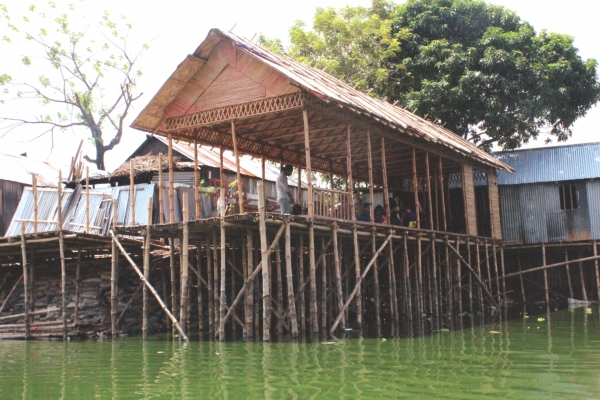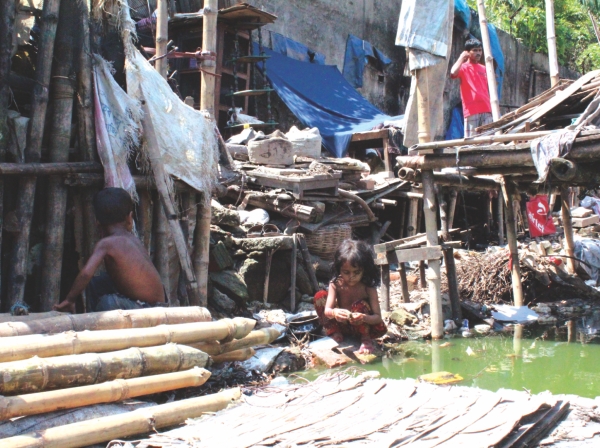
Inside
|

Slumdogs and Millionaires
CHITRANGADA studies how eviction is an ugly single stage plan with no thought for rehabilitation.
Of Ironies…
15 September, 2011.You could see young boys and girls in their yellow T-shirts running around, knocking on your car doors, giving out flyers and asking whether you are a registered tax-payer. Ticked and signed, they gave you a smile for the road. Volunteers for Bangladesh, a sister concern of JAAGO Foundation, partnered up with the National Board of Revenues (NBR)for the city-wide tax drive. The drive will hopefully help the Government to raise revenues that are critical to financing public facilities and services.
Irony is while KorviRakshand, the founder of JAAGO and Volunteers for Bangladesh, was being congratulated by the Tax Revenue Commissioner, on 20 September the Karailbastee school that the JAAGO teachers built was being destroyed by RAJUK authorities. Irony is while I am waiting for the potholes in front of my house to be fixed for the last 6 months, my tax money is going into police brutality and misuse of power instead. Irony is when standard Government procedures can take months to execute with the standard excuse that they are under-staffed and underpaid,suddenly tax payers money appears with police force, mobile courts, and chief engineers to break down poor people's homes.
Further irony is that while the rich and famous Dhaka City civil society will talk endlessly about the rural poor,we turn a blind eye to the sub-human living conditions and every day horrors of those who clean our homes, raise our children, drive our cars, cook our meals, open and guard our doors, build our homes, and keep the entire city's economy going.
The Eviction
On20 Sep, social media had several status updates and tweets on Karail slum getting destroyed. JAAGO Foundation runs a school for under-privileged children in the part of the slum that was under attack.Friends and volunteers rushed to the school and to the slum dwellers' side. The story according to the witnesses and survivors is the following.
The (in)famous mobile court magistrate Rokonoddowla and the Chief Engineer of RAJUK showed up with some 50 police officers and several day laborers with hammers, sickle, and whatever they could find to break down the structures along the wall of the TNT colony, built on top of the lake. The JAAGOschool is one of those structures. From what I know from my years of working in Karail, BRAC is the only other organization running a school for the slum children.
The police showed up around 10 in the morning, surprising everyone. Some red marks were made earlier that week, spreading words of a possible eviction. Threats are always made, so not much was made of the red markings till the eviction actually started happening.
The authorities tore down the structures without much resistance from the people till they entered the school.Police officers were not expecting English medium educated young teachers, some with legal education background, asking to see papers and eviction notice.
It just so happened during all the negotiations, the Magistrate lost his temper and arrested one of the friends of JAAGOwho is the son of a media personality and current Member of Parliament. In no time, media personalities and reporters showed up at the scene, demanding for some explanation on why the eviction was taking place, why there were no eviction notices, and why was one of their friends assaulted and handcuffed.
The Magistrate and his followers left but not without some last threatening words like the villainous characters in the movies. He will be back.
The Slumdogs
We are all certain, they will be back. Question is when.
While following up with this story. I noticed that other than a few individuals and fewer organizations, no one is quite rallied up against the complete violation of due process, the law and not to mention, of human rights and dignity. In any other human rights violation case, there is a human cry amidst the civil society, media and donor agencies. For the urban poor, there is just a simple, “oh, that's sad” and a conversation starter “did you hear about the eviction?”
Why?
Because they are slumdogs. They are filthy and wretched and, they make our city look dirty and poor. The poverty and its horrors are too physically close to us, in our faces for us to romanticize about it.
Then there are these strange notions about the urban poor which govern policies, programs, and our social interactions with them.
Myth 1
They are illegal. That's what everyone will tell you they grabbed lands which are not theirs and live on them without permission. If Government could have its land back, so much development could have happened.
Fact is much of the Government land is under-utilized. Land Ministry with all its corruption and inefficiencies refuses to digitize the land records which (a.) will take a long time to sort out and (b.) be an excruciatingly painful process because of the decades of land mismanagement and legal disputes over ownership. Government, to begin with, has no right to leave its resources un-utilized for an indefinite period of time, be it in the rural or urban areas.
On the case of legality I'll quote a blogger: “The government is so worried about illegal squatters, they should first go after Bashundhara for illegally grabbing public wetlands to the north east of the city and turning them into developments despite the hugely adverse impact on the rest of the city dwellers during flood season, “ SalehTanveer, Unheard Voice.
Some of the affluent real estates in Dhaka today were developed by private development companies who either coerced (both emotionally and financially) or forced their way into getting the plots from RAJUK and/or individual owners.We now watch expensive ads on how these are the residential areas of our dreams beautiful apartments, shopping malls, parks, schools, and hospitals cholona, akhoniekta plot booking diyeashi?
Thanks to private developers' market distortion and Government's age old land valuation, there is an enormous difference between the market price and the legal valuation of land. Anyone who is a property owner thrives in this widely accepted illegal system, while making it impossible for the poor people to find a decent shelter in town. When we drive up the price of property and rent, somehow it is still the poor's fault that they are unable to afford “legal” settlements. When people are spending almost half of their income on rent and utilities, we still think it is their fault that they live filthily, squatting on our backyards, living like slumdogs.
Myth 2
They are drug-dealers, Bangla-mod suppliers, center for societal destruction.
No one denies that there are drugs in slums, but that's also because the effective demand for illegal substances come from none other than the children of the rich with their fancy cars and cellphones waiting outside of the slum peripheries for a drop off. The 600 dollar Pumas will get ruined by the dirt and the filth of the slum, so hire a little 8/10 year old dropper/messenger for Tk. 20-40 for each runs to and from the dealer. I even know rich brats who told me they were doing these kids a favor “this is their earning Apu, it will help their families”.
Of course the extra earnings help but what hardly ever comes out is that when the slum children watch bhaloghorerbhaiya-apura buying ganja by the bags and dhyl by the gallons (phencidyll), somehow taking drugs become even more justified.
So parents who condemn the basteebashi and their drug-dealing, Bangla mod drinking ways, do you know where your kids were this evening?
Myth 3
Of all the allegations against the urban poor, my personal favorite is that they don't belong to the city. They should go back to where they came from the villages.
Again, I laugh. How many of us, middle class and upward, are in fact originally from Dhaka?
It amuses me when first generation Government officers, straight out of their mofosshol towns will dehumanize the urban poor for coming to Dhaka when their own wives will pressure them into staying in the capital during their entire civil service career. It amuses me to see non-profits working on rural development from Dhaka, never setting up a site office yet not wanting to get into the messy business of slums and their poverty.
So what does it take to be a Dhaka-ite? How do you claim this city as yours? Is it by affording an apartment on most probably grabbed land by a private developer? Or having an official position in the capital which was secured through non-official channels?
If you don't like the poor in the cities, create economic opportunities in other smaller towns and villages. If you don't like slums in your cities, don't concentrate all Government power at the capital.
The Millions Who Will Never Become Millionaires
Truth be told, the development sector likes to keep them a little filthy, a little poor. When they get evicted, it's a great story to tell. When a child from the slum makes it to university, it's a great story to tell.
How do they wash their clothes, feed and educate their children, have physical relationships, and even excrete feces are all great research topics and possible project “interventions”.
Development plans and budgets are made for the rural sector and endorsed by development partners, look at poverty as a multi-dimensional phenomenon. Rural poverty alleviation programs have well defined and strong economic and social capital building blocks. For the urban poor, the approach is still how to improve their “built environment”. Their built environment is quite horrendous. No human being should ever live like the way millions of people do in a Bangladeshi slum.

We justify to ourselves that till we secure the urban poor with tenure security in the long run, we must keep improving their situation for the time being. Exactly how much can be improved upon a highly congested space with one latrine for 100 households, and families of 5-8 are living in one slum unit?
There is just that much that can be improved upon the slum conditions. But it will always remain a slum.
It also benefits the city economy to keep them poor and in sub-standard conditions the urban poor are our supply of cheap labor who is keeping the economy running. The slum dwellers are needed especially during hartals and riots for Tk 100 and a free meal, any political affiliation can be bought. Slums are vote banks with everyone from the dalals to the politicians having a vested interest to keep the people poor.
There is no commitment from the side of Government or development partners to drastically change the lives of millions of urban poor around the country, and especially the ones in Dhaka. There is no resettlement plan for eviction and neither is there any conversation on the possibility of low-cost housing for the urban poor. They are to remain in their tin-shed shanties, with no formal access to basic services or have schools for their children or medical centers for the communities.
I hear through the development grapevines that some kind of an urban forum similar to the World Urban Forum is coming up for Bangladesh. While policies are drafted and projects are designed, I wonder how much of the core problems of the urban poor will be discussed and solved at these forums and gatherings of the pundits? I am sure papers and case studies will be presented on the 20 September eviction drive at the forum. By that time, a few more evictions will most probably take place with no interventions by donors, no human cry from the activists and definitely no protests at the ShaheedMinar by the civil society.